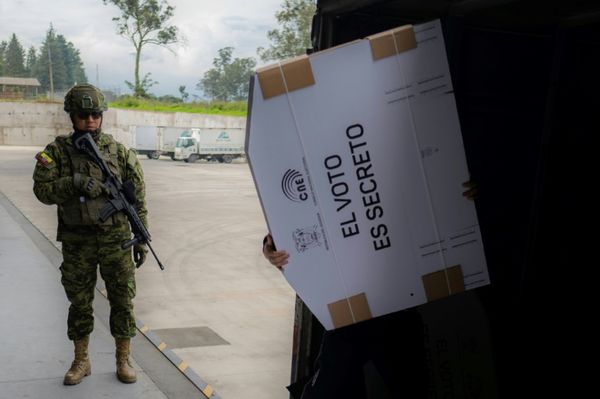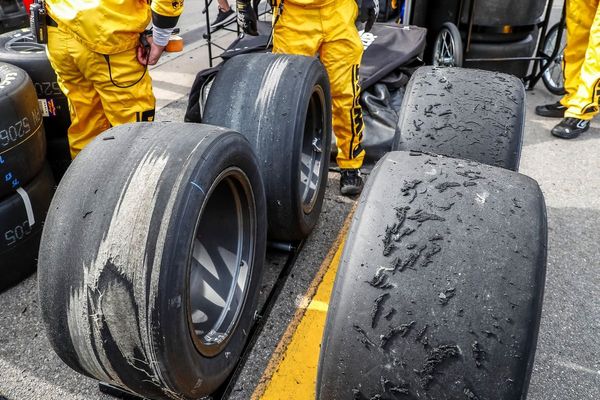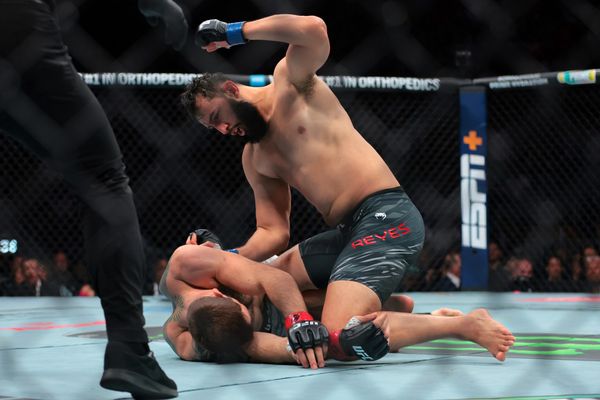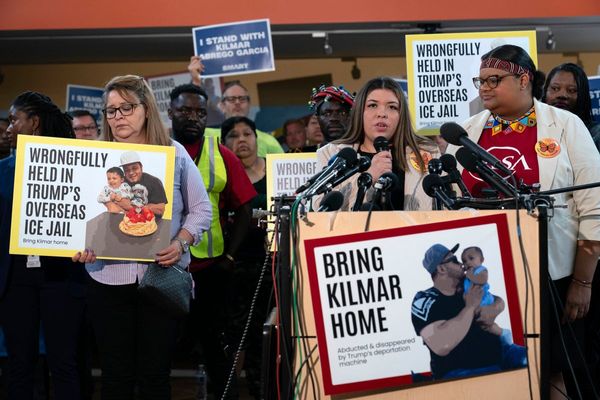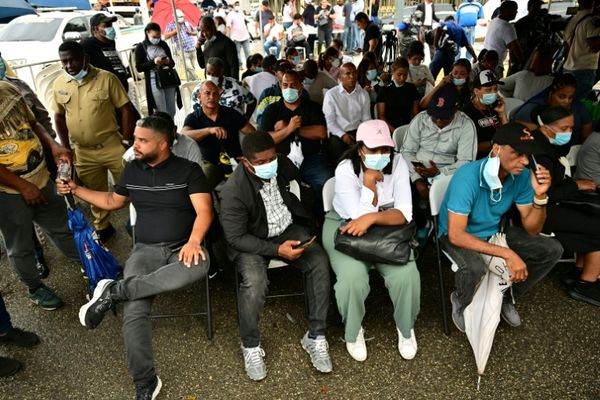
Thirteen-year-old Kíla Lord Cassidy is perched on a sofa. It’s a few hours until the UK premiere of an extraordinary film, The Wonder, in which she co-stars with Florence Pugh. Dressed up for the red carpet, Kíla is pretty as a picture in a pink lace dress smothered with embroidered flowers, her long hair blow-dried into waves and sparkly glitter ballet shoes on her feet. The trouble for the 13-year-old is that she’s too young to legally watch her own film. “It’s a 15,” she says, grinning ear to ear. “I’m not allowed.” The plan is to slope off with her dad and little brother after the red carpet, as the rest of the cast walk into the cinema.
On the sofa beside Kíla is her mum, the Irish actor Elaine Cassidy, beaming, proud as anything. She will be part of that group heading into the premiere because, in an inspired piece of casting by the film’s Chilean director Sebastián Lelio, she plays Kíla’s mother. It’s a small role, but one she couldn’t resist. “To be around that kind of talent, I’d have swept the set. Because my soul has been fed. You know?”
Sitting side by side in this hotel room in London, the two don’t stop smiling for our entire conversation, pinging off each other, finishing each other’s sentences – talking over each other in excitement. Yet The Wonder is no light watch. It’s an adaptation of a novel by Emma Donoghue set in a speck of a village in the Midlands of Ireland in the 1860s. Kíla plays a “fasting girl” called Anna who supposedly hasn’t eaten for four months but is miraculously fresh-faced and healthy. Ireland at this time is still haunted by the Great Famine, which claimed a million lives in the 1840s. Pugh is an English nurse hired to watch over the 11-year-old and take notes. Anna claims to be living on “manna from heaven”. The question for the film is whether she is an attention-seeking hoaxer, some kind of medical wonder, or a saint.

What is not in any doubt is that Kíla’s performance is astonishing: she disappears utterly into character. With her translucent skin and huge expressive eyes, she is the perfect choice to play a girl who might be a saint. And just last month, she picked up the first nomination of her career, best breakthrough at the British independent film awards.
Kíla was 11 when she was cast. To audition, she filmed herself at home in London, sent off the tape and hoped for the best. “We were like, ‘OK, it’s enough to get into the next round,’” says her mum. But the casting didn’t go to a second round. Instead, five weeks later, Lelio telephoned. “When I told Kíla the news,” says Elaine …
Kíla cuts in giggling. “I started bawling on the phone. It was a bit embarrassing.”
“She was nicely overwhelmed,” smiles Elaine. “It was like winning the lottery.”
Later, when I speak to Lelio via Zoom from his home in Santiago, he says that by the time Kíla’s tape arrived, he was panicky. Time was running out: preproduction was looming and he was getting through dozens of tapes a week. “I just couldn’t find her,” he says, eyes widening. “The characters of the nurse and the girl are the two beating hearts of the film. That relationship had to be electric and convincing. Florence is such a talented actress. We needed someone great.”
Then Kíla’s tape landed. “I was speechless,” he says. “She was 11 when she recorded that. Her understanding of the role, of Anna, was extraordinary.” He pauses and adds: “I knew we had a film then.”
It was a producer who suggested casting Elaine as Anna’s mother. “I started Googling ‘Elaine Cassidy’ and was like, ‘Of course!’” It was a privilege to film a real mum and daughter, he adds. “The camera knows they are mother and daughter. It knows.” Before speaking to Elaine, though, Lelio first asked Kíla’s permission: would she be happy filming with her mother? “She gave the right answer,” Elaine deadpans.

Before shooting, people kept asking Elaine if she felt nervous for her daughter, worrying that it was such a big role. Not a bit. “I know my daughter,” she says. “I know what she’s capable of.” Besides, two years earlier, she’d seen Kíla in action on the set of The Doorman, a film about an ex-marine battling art thieves that co-starred Jean Reno and Ruby Rose. “She was nine years old, speaking in an American accent, dragging Ruby Rose around.”
“It was like being in a sweet shop,” Kíla chips in. “I was having so much fun.”
Being on a film set is nothing out of the ordinary for Kíla. One of her earliest memories, age three or so, is standing behind a camera watching her mum emerge in a beautiful dress on the set of The Paradise, the BBC’s Victorian costume drama about the lives and loves that swirl around the first English department store. “I forgot everything: my dad, the cameramen. I just looked at my mum and was like, ‘Gosh!’” She mimics a swoon.
Elaine and her husband made a point of taking the kids on set visits when they were little. “So when Mummy and Daddy were away,” she says, “they have an image to reach for.” Daddy is Stephen Lord, who has starred in Shameless, EastEnders and Coronation Street. Elaine got her break in 2001 playing Runt in Disco Pigs and is now perhaps best known for portraying DC Dinah Kowalska in Paul Abbott’s brilliant police comedy drama No Offence. The couple also have a son, 10-year-old Lynott, who has no intention of becoming an actor, reports his sister. “He’s really shy. But he’s beautiful. You wouldn’t mind looking at him on a screen.”
Lelio wrote the script of The Wonder with novelist Donoghue and screenwriter Alice Birch, who also wrote Pugh’s breakthrough movie, Lady Macbeth. The Wonder is a little like Lady Macbeth, in that it feels bracingly modern – a feminist treatment of a 19th-century story. What it slowly uncovers is a world of control and oppression. An all-male committee acts as the gatekeeper of the village’s little miracle. Ciarán Hinds plays the priest, Toby Jones the local doctor, and the film unfolds slowly like a psychological thriller, with the mystery of Anna’s fasting unravelling towards the end as a terrible secret is revealed (it would spoil the film to spill it). Is the horror of these scenes difficult to talk about?

Elaine shakes her head. “No, we’re an open family.”
“If I had any concerns,” adds Kíla, “I would turn to them straight away.”
Elaine adds: “There’s no taboos. There’s nothing our kids can’t ask us, because then they might go to someone else. I want to be the one to give the information.” She’s a believer in the maxim: if they’re old enough to ask, they’re old enough know. “How in depth you go into the answer depends on what age they are. But we talk as a family, don’t we?” She leans into Kíla, who’s nodding.
“It’s dark subject matter,” adds Elaine. “But that’s what you love as an actor. Do you know what I mean? To have stuff to do. You don’t want, ‘I’m just going to go to the shops for a pint of milk.’ Freud said the best therapy is role play. So I’m like, ‘Jesus, I must be really bloody healthy.’” She laughs. “Because that’s all I do as my job.”
The Wonder shot for six weeks in Ireland, Kíla remote learning over Zoom in between filming. Her dad was her chaperone for a few weeks, then Elaine took over, once she had completed her scenes. Kíla, thanks to her mum and her cousin in Dublin, could already do a fair Irish accent, and worked on a more specific Midlands one with a dialect coach.
“You’ve got a really good ear,” her mum says. “When I was a toddler,” Kíla replies, “I would speak in a London accent then spend a week in America and –”
“Daaaaad!” finishes Elaine, letting rip with a twangy squawk.
I ask Kíla if she tried going hungry to see what it was like. She shakes her head emphatically and Elaine looks horrified, gasping: “No!” Elaine has been thinking about children going hungry as the cost of living crisis intensifies, but there was no question of Kíla trying it. Elaine reminds me of an old showbiz story: how, on the set of Marathon Man, when Dustin Hoffman was exhausted after staying up for three days just like his character, Laurence Olivier is said to have quipped: “My dear boy, why don’t you just try acting?”
“She went down the acting route, didn’t you?” Elaine says, then lists the catering that was available on set. “There were crepe vans and dumpling vans, and a craft table.”
Kíla pipes up: “No child was starved during the process of making this film.” And with that they collapse into one last fit of giggles.
The Wonder is on Netflix now.
